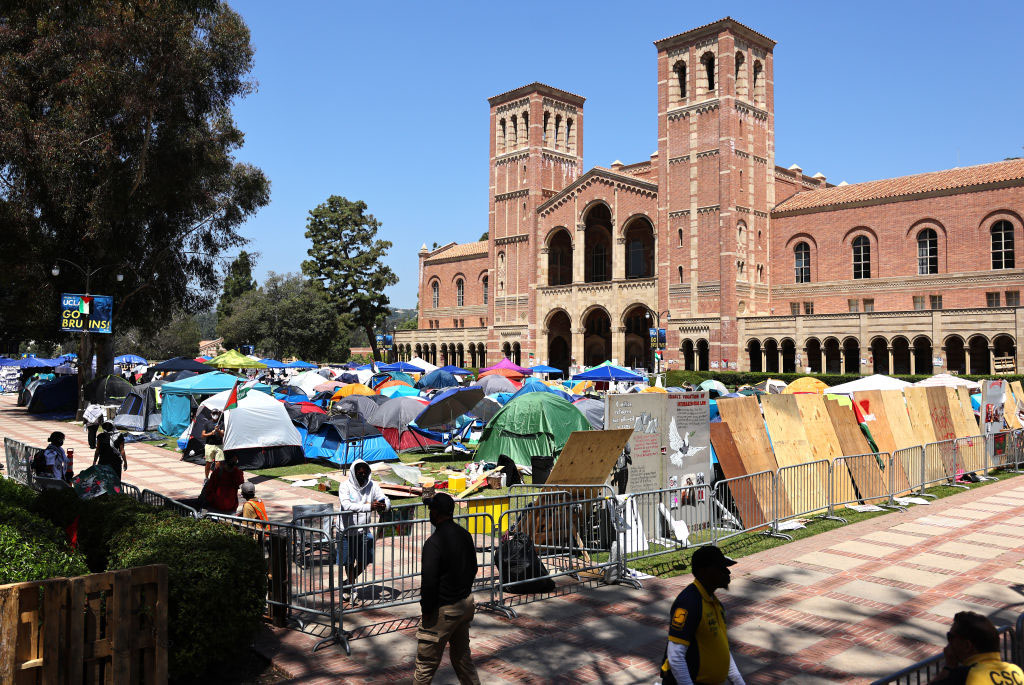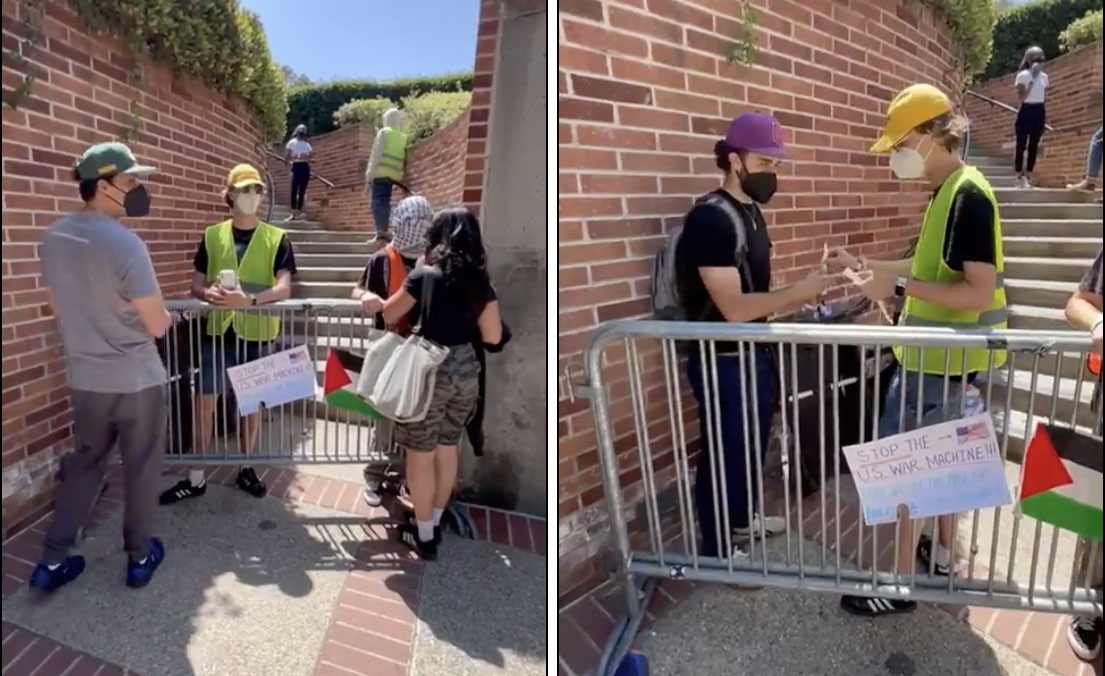Anyone who’s ever watched the annual Chabad Telethon, to be aired live this Sunday from 5 p.m. to midnight on UPN Channel 13, knows that it’s the single most graphic demonstration of this Chassidic group’s ability to rope in big-name Hollywood celebrities.
The show was first broadcast in 1980, when it was co-hosted by Carroll O’Connor and Jan Murray as a fundraiser to replace Chabad headquarters in Westwood after a tragic fire. Since then, a long list of glitterati have shown up each year to sing, dance, tipple a bissle and appeal for funds to help Chabad’s drug rehab center in Los Angeles and other social service projects.
James Caan and Elliot Gould, fixtures from the beginning, have been joined by the likes of Sid Caesar, Bob Hope, Michael Douglas, Whoopi Goldberg, Shelley Winters, Tony Danza, Judd Nelson, Regis Philbin, Steve Allen, Edward James Olmos and Valerie Harper. In 1997, the cast of "Friends" produced a special segment that aired only on the telethon. One-time Chabad fellow traveler Bob Dylan has made four surprise appearances. Former Vice President Al Gore stumped for the cause three times.
In its first year, the telethon netted $1 million. Last year, it topped $6.5 million. The show is so hip, it’s engendered a rash of telethon-watching parties all along the Hollywood circuit as folks gather in living rooms to see who’ll show up next to kick up their heels in a mass hora with Chabad’s West Coast founder and director Rabbi Boruch Shlomo Cunin.
One of the most intriguing figures on the telethon is Academy Award-winning actor Jon Voight, a regular for more than a decade. Like many of those who plug the Chabad cause, he’s not Jewish, but what makes his involvement unusual is that it’s so extensive. Not only has he been co-hosting the show for years (along with several other Chabad fundraising events; notably the group’s Israel-based "Children of Chernobyl" effort), but he’s now a friend of the Cunin family. He studies Torah and reads Chassidic literature — having, by his own admission, a bookcase filled with the writings of the late Lubavitcher Rebbe Menachem Mendel Schneerson — and he seeks out Chabad centers whenever he’s on location for a new film.
Two years ago, while shooting the NBC miniseries "Noah" in Melbourne, Australia, Voight gave a call to 20-year-old Tzemach, one of Shlomo Cunin’s 13 children, then studying in a local yeshiva, and asked for help in researching the part. Voight acknowledges that the final film was "controversial" (at one point, Voight somehow morphs into Abraham, and pleads with God to spare Sodom and Gomorrah), and he says that without the information he gained from studying with the Cunins, it would have been a lot worse. "It may not be accurate biblically, in terms of the story, but I think in the end it was pretty good. There are good little lessons in it. I haven’t said this on television, but it was a battle to try and make it a decent portrait."
The 62-year-old actor first met Cunin in 1986, as a return favor for a friend who helped Voight hold a press conference for a Hopi leader at Temple Beth El. Cunin invited him down to Chabad’s drug rehab center in Pico-Robertson. "I walked in and saw a lot of weight lifters, real characters," Voight recalls. "In the back area I see this guy sitting at a table — big beard, with a hat on. He looked like a rabbi. He was in his shirtsleeves, and he was hand-wrestling these guys. They were all lined up and, one after another, he’s putting them down. Then someone told him I was there, so he put on his coat, grabbed me and gave me a hug. I said, ‘this is my kind of guy.’"
Voight’s commitment to the Chabad cause goes way beyond his admiration for Cunin’s arm-wrestling skills. In the mid-1980s, the actor embarked on a period of spiritual seeking. "I made some mistakes in my early life, and had to recover from them," he admits. Voight was brought up Catholic and has no intention of converting to Judaism. But he says that of all the religions he studies, he has a special fondness for Jewish learning and values. "Judaism is an amazing fountain of information. It’s not the only answer, but I have tremendous regard for it."
Voight remembers studying the Bible as a boy in Catholic school, and being particularly taken with Genesis and the stories of the Hebrew prophets. "I think the Bible is helpful in that it describes the lives of people who strive and who fail, and who pick themselves up and continue on. All the great prophets had their difficulties, yet they overcame them."
The star of "Midnight Cowboy," Best Picture of 1969, and "Coming Home," for which he took home his own Best Actor award in 1978, Voight is a gentle, soft-spoken man, who is obviously deeply taken with Judaism, Lubavitcher Chassidism and the Cunin family.
"One of the big things about the Jewish religion is that its fruit is the deed. I think that is portrayed perfectly by Chabad, and that’s why I’m with them."
Voight never met the Lubavitcher Rebbe, whom he calls a "great and extraordinary leader." But Schneerson sent his thanks to Voight through Cunin, along with a request that the actor speak out on the telethon in support of the seven Noahide commandments. (These are basic laws of human morality, supposedly given to the nations of the world by God at the time of Noah as a precursor to the Ten Commandments.)
Voight did so. "They appeal to my own sense of what I feel is a high purpose, which is to try to get everyone to an understanding of what they’re asked to do, what life’s responsibilities are. These very simple seven laws of Noah are good basics."
Hollywood could stand some of that message, Voight believes. "We’re given the idea by our culture that if you have enough money, enough cars, enough women, everything’s taken care of. It’s perfectly all right to be as selfish as you want. There couldn’t be a more poisonous message."
Saying that he’d love to "spend the rest of my life in yeshiva," Voight says he knows that’s unrealistic. "If we look for truth, we can be in a constant state of exuberance. That’s what I find in Chabad. They create an energy of positive thinking and good cheer, and through that, they’re able to do tremendous good work. Those who scoff at them are simply keeping themselves from that energy, and that’s unfortunate."






















 More news and opinions than at a Shabbat dinner, right in your inbox.
More news and opinions than at a Shabbat dinner, right in your inbox.